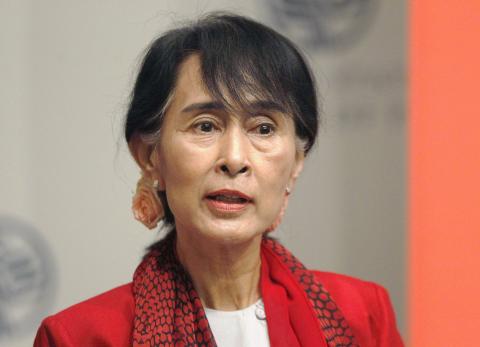Democracy icon Aung San Suu Kyi was set to receive the US Congress’ highest honor yesterday during a landmark trip in which she has called for the lifting of sanctions on her native Myanmar.
The Nobel peace laureate was awarded the Congressional Gold Medal in 2008, during the 15 years she spent under house arrest, and is only able to receive it now as relations thaw between the US and the south east Asian nation.
On Tuesday Aung San Suu Kyi thanked the US for its years of support, but said further reforms must proceed without the pressure of sanctions and insisted improved relations with Washington would not pose a threat to Beijing.

Photo: Reuters
“In the end, we have to build our own democracy,” she said in a speech in which she appeared careful not to annoy leaders back home who have initiated reforms.
The opposition leader had long supported economic sanctions to pressure her jailers, Myanmar’s junta, which nominally disbanded last year.
The US has been rolling back restrictions, in July opening Myanmar up to US investment despite Aung San Suu Kyi’s earlier unease about US firms doing business with the state-owned oil and gas company.
“There are very many other ways in which the US can help us to achieve our democratic ends ... Sanctions are not the only way,” she said.
Aung San Suu Kyi, now a member of parliament, said she believes Burmese President Thein Sein is “keen” on change in the nation formerly known as Burma, but said the judiciary — and not the executive — was reform’s “weakest arm.”
“We have passed a first hurdle, but there are many more hurdles to cross,” she said.
On the eve of Aung San Suu Kyi’s trip, her party said that authorities freed another 87 political prisoners in what analysts saw as a new gesture by Thein Sein ahead of his own visit to the US next week.
In the award ceremony before the Asia Society and US Institute of Peace, Aung San Suu Kyi took pains to reassure China, which was the junta’s main ally.
Many US observers believe Thein Sein launched the reforms out of concern over Beijing’s overwhelming political and economic dominance in Myanmar.
While acknowledging it was a “natural question” whether US interest in Myanmar was spawned by a desire to contain China, Aung San Suu Kyi said the warming ties should not “in any way be seen as a hostile step toward China.”
“For us to put it very simply, it would be to our advantage for the US and China to establish friendly relations. This would help us a great deal,” she said.
Aung San Suu Kyi, dressed in a red jacket, began her visit by meeting another of the world’s most prominent women, US Secretary of State Hillary Rodham Clinton, who marveled at her political odyssey.
“It’s wonderful to see Aung San Suu Kyi back in Washington as a free and forceful leader of a country opening up to the world in ways that would have been difficult to imagine even recently,” Clinton said.

Kehinde Sanni spends his days smoothing out dents and repainting scratched bumpers in a modest autobody shop in Lagos. He has never left Nigeria, yet he speaks glowingly of Burkina Faso military leader Ibrahim Traore. “Nigeria needs someone like Ibrahim Traore of Burkina Faso. He is doing well for his country,” Sanni said. His admiration is shaped by a steady stream of viral videos, memes and social media posts — many misleading or outright false — portraying Traore as a fearless reformer who defied Western powers and reclaimed his country’s dignity. The Burkinabe strongman swept into power following a coup in September 2022

‘FRAGMENTING’: British politics have for a long time been dominated by the Labor Party and the Tories, but polls suggest that Reform now poses a significant challenge Hard-right upstarts Reform UK snatched a parliamentary seat from British Prime Minister Keir Starmer’s Labor Party yesterday in local elections that dealt a blow to the UK’s two establishment parties. Reform, led by anti-immigrant firebrand Nigel Farage, won the by-election in Runcorn and Helsby in northwest England by just six votes, as it picked up gains in other localities, including one mayoralty. The group’s strong showing continues momentum it built up at last year’s general election and appears to confirm a trend that the UK is entering an era of multi-party politics. “For the movement, for the party it’s a very, very big

ENTERTAINMENT: Rio officials have a history of organizing massive concerts on Copacabana Beach, with Madonna’s show drawing about 1.6 million fans last year Lady Gaga on Saturday night gave a free concert in front of 2 million fans who poured onto Copacabana Beach in Rio de Janeiro for the biggest show of her career. “Tonight, we’re making history... Thank you for making history with me,” Lady Gaga told a screaming crowd. The Mother Monster, as she is known, started the show at about 10:10pm local time with her 2011 song Bloody Mary. Cries of joy rose from the tightly packed fans who sang and danced shoulder-to-shoulder on the vast stretch of sand. Concert organizers said 2.1 million people attended the show. Lady Gaga

SUPPORT: The Australian prime minister promised to back Kyiv against Russia’s invasion, saying: ‘That’s my government’s position. It was yesterday. It still is’ Left-leaning Australian Prime Minister Anthony Albanese yesterday basked in his landslide election win, promising a “disciplined, orderly” government to confront cost-of-living pain and tariff turmoil. People clapped as the 62-year-old and his fiancee, Jodie Haydon, who visited his old inner Sydney haunt, Cafe Italia, surrounded by a crowd of jostling photographers and journalists. Albanese’s Labor Party is on course to win at least 83 seats in the 150-member parliament, partial results showed. Opposition leader Peter Dutton’s conservative Liberal-National coalition had just 38 seats, and other parties 12. Another 17 seats were still in doubt. “We will be a disciplined, orderly